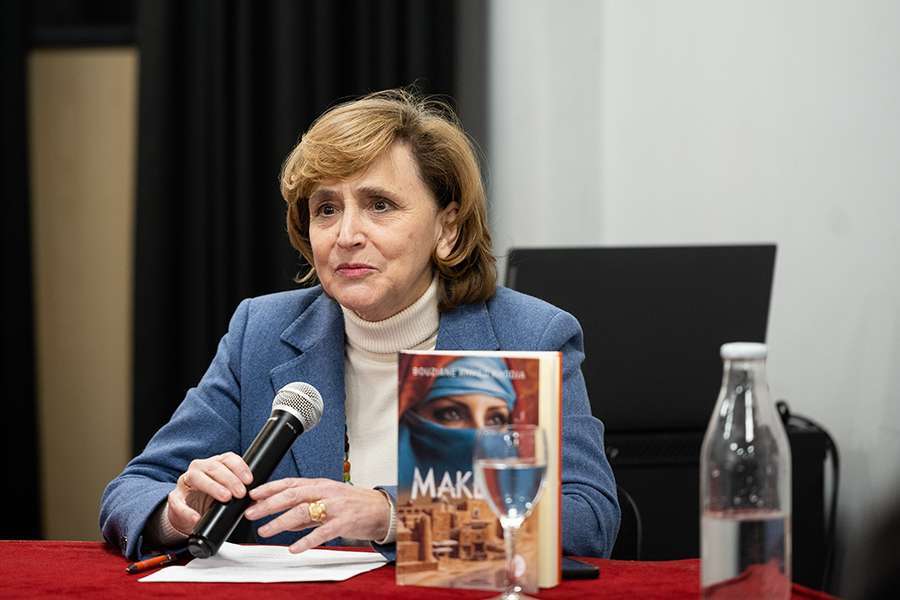Bouziane Ahmed Khodja: "Makeda is the spokesperson for all women"

Music. Silence in the hall. The violins seem to cry. Perhaps they are really crying. Maestro Julio Maroto conducts. Applause with a heavy heart. We are at the presentation of "Makeda", the first novel written in Spanish by the Algerian-born journalist and writer Bouziane Ahmed Khodja. Margarita Hernando de Larramendi, president of the Literature section of the Ateneo, gives him the floor. He begins by telling us that his work was born out of his constant train journeys.
On those journeys to Madrid, the author set out to give a voice to women subjected to ancestral traditions such as genital mutilation; to remember the suffering and trauma that this cruelty entails for them for the rest of their lives. "I wanted a story written in the first person by a woman. I wondered what would have become of my wife, my daughter, my mother, my colleagues, my friends if they had suffered this drama," says Bouziane Ahmed, who says, with a certain sadness, that "discrimination is born with women", a fact that, throughout history, she adds, has been exploited by men.

"It has been a tremendous experience. I have been searching for what a woman can feel throughout her life, not only with genital mutilation, but also with the patriarchal weight, the father's look at his daughter, the mother's betrayal, the grandmother and the aunt who sells her...", says the director of the programme "Medina" on TVE's La 2. "Makeda" is a story within many stories, where one feels pain, cruelty, violence and suffering, but also, he adds, where one travels, sees the beauty of the desert and leaves an open door to hope and love.
The protagonist was only 8 years old when she lived her terrible story, a practice, says the author, that is assimilated as normal in the social tradition, that occurs in African women in the Arab and Muslim world, but not because of religion, but because of this patriarchal society, and so, says Bouziane Ahmed Khodja, it is reflected in his novel, a beautiful text that aims to give visibility to millions of girls. "This story is imagination, but it is a reality that is being lived and that we must begin to change through education". This is what he wants: a new look at women, not just African women. "Makeda is the spokesperson for all women," he says.

A short novel of 123 pages that Pilar Requena, director of the programme Documentos TV, defines "as a treasure" and in which the author's sensitivity stands out. Pages that lead her to remember the situation in which many women live, especially now in Afghanistan, where they are being repressed and stripped of their rights. "What have we women done to deserve the hatred of so many men," asks Requena.
And the question remains in the air as she continues to talk about the writing of this novel that shows a terrible world, but which knows how to delve into the love, hope and rebelliousness of the protagonist that leads her to seek a better world. "The narration is so beautiful that at times it makes you forget how terrible Makeda's story is," says the journalist.

A beauty that María Rodríguez, deputy director of the programme directed by the author, praises. She has shared emotions, reflections and feelings with him after reading "Makeda", as she does with the public in this presentation: "How fortunate to have been born in Western society where, if there is still a way to go, it is nothing comparable to other places".
And the journalist, who "felt chills as she read this story", recalls the millions of girls and young women who suffer this cruel practice in the world, stories, she says, that should not happen, that go against their rights, that are not dogmas of faith, but ancestral customs that, she states emphatically, "must be eradicated".

She looks at the author, her director and partner for years, because he wants to highlight the fact that his culture is Islamic and that he is a Muslim, something that matters, "because he steps forward and denounces in a beautiful and poetic way everything that is happening, while opening the door to hope".
Time for the reading. The violins begin to play. María Rodríguez raises her voice to be heard in the midst of the music. "A cry, a cry alone...". And silence returns. And the violins cry again while "the blood gushes out..., without anaesthesia, without doubts, without remorse...".

And the audience listens with emotion to the beautiful voice of Maria reading the first chapter of "Makeda", "the broken girl before she became a woman", who is "being turned into an honourable woman". Until the final words of the first chapter: "This is how she said goodbye to them forever, with her eyes. You have left me in the hands of a sorceress who takes my life".
And the voice dies away. Silence. The violins continue to cry. The audience applauds. "Makeda" is violence; "Makeda" is love.









